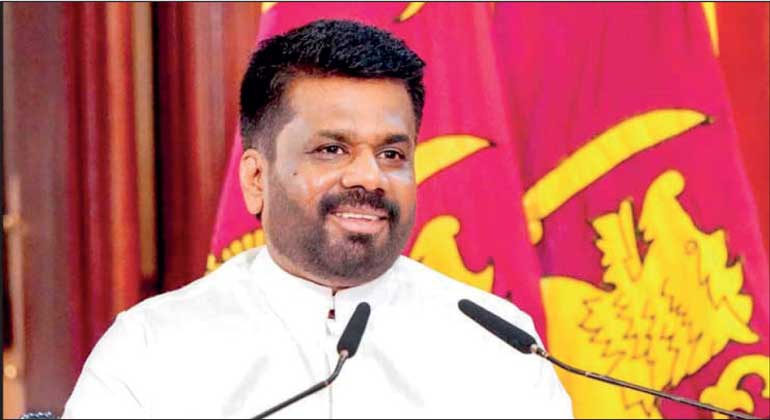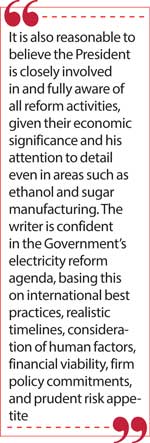Wednesday Feb 18, 2026
Wednesday Feb 18, 2026
Wednesday, 13 August 2025 00:26 - - {{hitsCtrl.values.hits}}

. President Anura Kumara Disanayake
 In his compelling speech to Parliament last Thursday, President AKD emphasised repeatedly that there is a deliberate and coordinated disinformation campaign aimed at undermining every major initiative his Government undertakes and belittling the progress made so far. The writer believes that most of this criticism originates from the Opposition and a core group fundamentally opposed to any efforts by the NPP Government to improve Sri Lanka.
In his compelling speech to Parliament last Thursday, President AKD emphasised repeatedly that there is a deliberate and coordinated disinformation campaign aimed at undermining every major initiative his Government undertakes and belittling the progress made so far. The writer believes that most of this criticism originates from the Opposition and a core group fundamentally opposed to any efforts by the NPP Government to improve Sri Lanka.
Given this reality, it is often futile to engage directly with their flawed arguments. Instead, a more productive approach is to objectively analyse these projects and suggest improvements where gaps exist. Although the President did not explicitly mention power sector reforms, the essence of his remarks clearly reflected how his Government operates and the economic development path it pursues.
Addressing flawed economic criticisms
It is useful to unpack some of the President’s comments on the misguided criticisms of the economy by certain disgruntled groups, which have been proven wrong:
These examples alone, among many others, demonstrate that the economy is stabilising, with currency stability lasting nearly a year, which in turn reduces the black economy’s vibrancy. Moreover, the first half of the year saw the highest export income ever recorded, with an 11% increase in exports to the EU, 35% to Africa, and 22% to East Asia. Tourism revenue and overseas remittances are also projected to reach record highs based on current trends.
 These indicators collectively portray a Government on the right track to heal the ailing economy it inherited last year. This begs the question: why are some so intent on finding faults and undermining our country’s economic progress? The President openly called on one of the Opposition’s “so-called economic gurus” to stop demeaning the state of the economy and spreading falsehoods, which damage the country’s reputation among international investors. Similar unfounded criticisms have appeared in articles in this newspaper and other media outlets in recent weeks, especially concerning electricity reforms, issues addressed below.
These indicators collectively portray a Government on the right track to heal the ailing economy it inherited last year. This begs the question: why are some so intent on finding faults and undermining our country’s economic progress? The President openly called on one of the Opposition’s “so-called economic gurus” to stop demeaning the state of the economy and spreading falsehoods, which damage the country’s reputation among international investors. Similar unfounded criticisms have appeared in articles in this newspaper and other media outlets in recent weeks, especially concerning electricity reforms, issues addressed below.
Understanding how the NPP Government works
The writer believes that some criticisms stem from a fundamental misunderstanding of how the NPP operates. Yet, there are also deliberately flawed critiques, mostly from those who refuse to accept the leadership of President AKD and the NPP outright. Some critics act from ideological or political motives, while others are loyal to alternative leaders, such as ‘RW the Saviour’.
From an outside perspective, the NPP functions as a highly team-oriented entity, led by an astute, intelligent, committed, and charismatic leader whose capabilities exceed most peers.
Regarding electricity reforms, the focus of this article, the Government benefits from a strong, expert team. Their policies and strategies were well-formed prior to elections, and commitments to voters on electricity reforms have been firm. Thus, it is both unfair and illogical to vilify the Director General of the Electricity Reform Unit, who is, in fact, the public face of a large team of local and international experts. The official committee responsible for reforms, appointed by the Minister, engaged stakeholders without materially altering the Government’s declared policies and strategy, though critics exploited its composition as a supposed flaw. Such criticisms must be weighed against similar baseless accusations faced by respected experts like Hans Wijesuriya, head of the Government’s IT strategy, which the President himself dismissed during his speech.
It is also reasonable to believe the President is closely involved in and fully aware of all reform activities, given their economic significance and his attention to detail even in areas such as ethanol and sugar manufacturing.
The writer is confident in the Government’s electricity reform agenda, basing this on international best practices, realistic timelines, consideration of human factors, financial viability, firm policy commitments, and prudent risk appetite.
Reforming the CEB transmission system
Previous articles by this author, published on 1 July and 21 July 2025, detailed key aspects of the proposed restructuring of the Ceylon Electricity Board (CEB). Some critics argue that transmission assets should be privatised, claiming it is uneconomical to keep them State-owned. However, a global look at power sector reforms shows that most countries in Asia, Africa, Europe, Scandinavia, and Australia retain state ownership of transmission networks. This includes Norway, Sweden, Finland, France, South Korea, Vietnam, Brazil, Morocco, Jordan, South Africa, Pakistan, Bangladesh, Malaysia, Indonesia, and largely India. Countries like the UK and Chile privatised transmission in the early 1990s under specific political contexts, while in Australia, only certain states (Victoria, New South Wales, and South Australia) have privatised their transmission networks.
Concerns about transmission expenditure and affordability abound. The writer’s investigations estimate annual transmission maintenance costs around $ 9 million (Rs. 2.7 billion) for basic upkeep, increasing to about $ 17 million (Rs. 5.1 billion) for high-quality maintenance. Including refurbishment, costs may rise by $ 5 million annually, totalling approximately $ 22 million (Rs. 6.6 billion) per year to maintain a robust network.
As in many countries, the CEB transmission system is generally in better condition than the distribution network. Historical blackouts mainly resulted from poor management rather than technical or financial issues. The infamous blackout on 9 February this year was primarily due to management failures. The proposed new Transmission Holding Company aims to transform culture and management practices to ensure efficient operation from both technical and financial perspectives, something proven achievable worldwide with the right structure, people and processes.
To reach a 70% renewable energy target by 2030, including new transmission lines, battery storage, and digital upgrades, capital expenditure is estimated between $ 1.5 billion and $ 2.5 billion. This assumes scaled annual investment and existing financing pledges from institutions like the Asian Development Bank. Critics mistakenly suggest these funds are immediately required, which is not the case. The reforms clearly envisage that most high-end investments will be driven by private sector participation, mainly through foreign direct investment.
Conclusion
The transmission network is a natural monopoly, and keeping it under State ownership is both appropriate and a sovereign right of the Sri Lankan people.
Under President AKD’s leadership, the economy is expected to strengthen significantly over the next two years, positioning the country to fund some of these critical investments from its own resources.
To meet the ambitious target of 70% renewable energy by 2030, the soon-to-be-established National Systems Operator (NSO) will determine the timing and approach for financing transmission upgrades, while selectively engaging private participation where it adds value.
In this context, it is essential that criticism of the electricity reforms be accurate and objective, so as not to damage the country’s standing with international lending agencies or deter potential private investors who might fund transmission upgrades.
(The writer is an electrical engineer with over 25 years of experience in Australian Electricity Networks as a Manager and a Principal Engineer. He has also worked in Saudi Arabia and as an Electricity Safety Regulator. He worked as an electrical engineer at CEB, in the first 10 years of his career. He could be contacted at [email protected].)